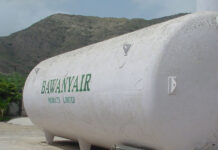Pakistan has witnessed an increase in high-speed diesel (HSD) imports during September, as a result of the crackdown on smuggling through the Iranian border.
According to oil industry officials, Pakistan imported a total of 120,954 tonnes of HSD in September, a substantial rise from the 109,745 tonnes imported in August. This surge comes after Pakistan refrained from importing any HSD in July, relying instead on domestic production and smuggled Iranian fuel to satisfy its needs.
The HSD import figures for August and September combined stand at 230,799 tonnes, reflecting a shift in Pakistan’s energy dynamics. This shift is attributed to the government’s crackdown on smuggling and a burgeoning demand from the formal sector, encompassing transportation, industry, and agriculture.
Smuggling, particularly the influx of lower-priced Iranian diesel, has long been a challenge for Pakistan’s oil sector, impacting local oil marketing companies’ sales. However, the renewed emphasis on border security and declining diesel prices have contributed to the recent growth in diesel imports.
Notably, HSD sales in Pakistan plummeted to 394,000 tonnes in September, marking the lowest level since the onset of the Covid-19 lockdown in March 2020. These sales figures experienced a 24 percent year-on-year drop and a 28 percent month-on-month decline. Several factors are cited as contributors to this decline, including record-high diesel prices, reduced agricultural activity, and decreased power generation.
HSD prices surged by 12 percent in September, dissuading consumers from purchasing diesel. Despite these challenges, industry officials remain optimistic about the future, expecting that the HSD imported in September will drive increased sales in October. The recent dip in diesel prices and tighter border security measures are anticipated to bolster oil sales in the coming months.
In a broader context, Pakistan’s overall petroleum product sales recorded a significant decline in September, totaling 1.06 million tonnes. This figure represents a year-on-year reduction of 31 percent and a month-on-month drop of 25 percent, underscoring the evolving dynamics within the country’s energy market























